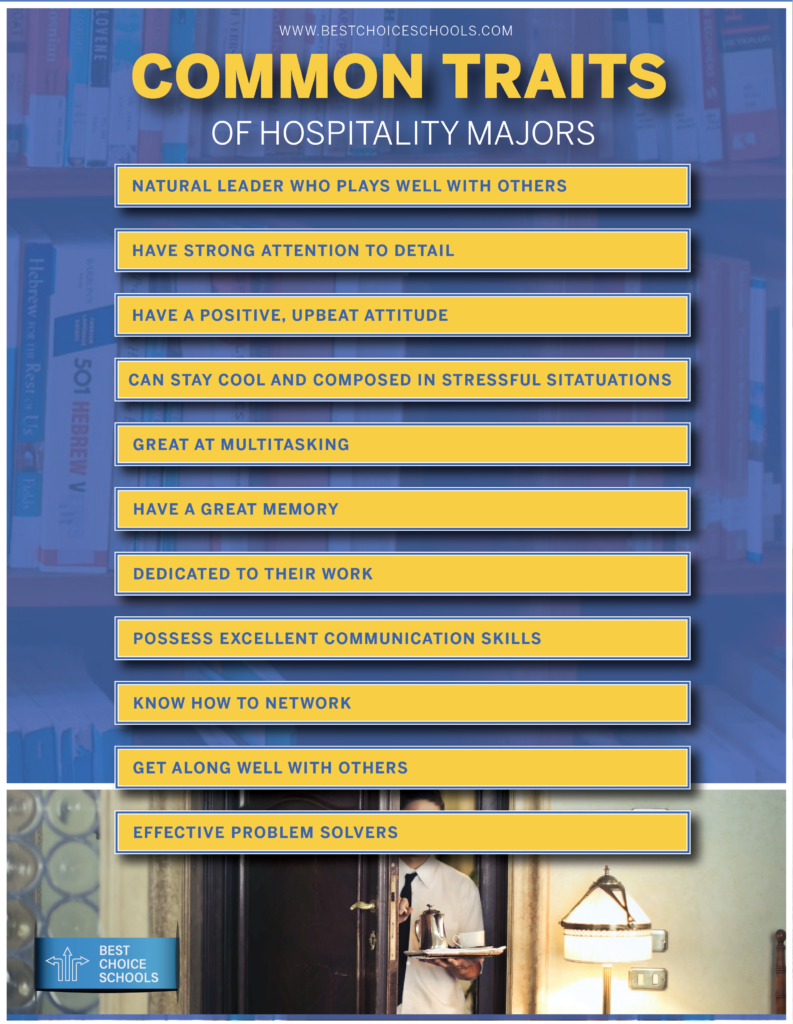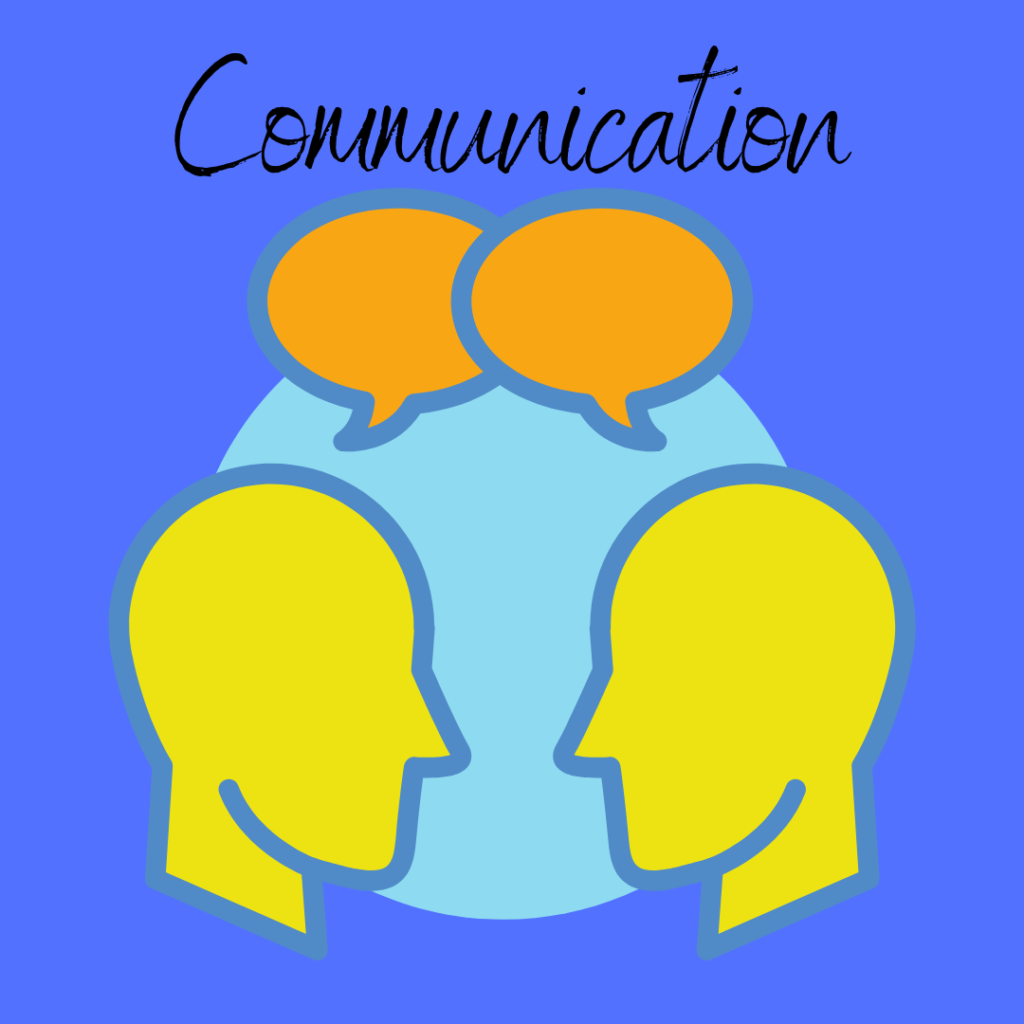
Choosing a major involves more than just throwing a dart and seeing what sticks. In fact, if you want to go into the hospitality field, you should consider doing a deep dive into both your personality and your college choices. Looking at the best traits of hospitality majors can help you make an informed decision. .
A Hospitality management degree is a popular choice, as it involves working in various industries such as hotels, restaurants, executive clubs, catering, and much more. But in general, working in any aspect of hospitality consists of meeting hundreds or even thousands of new faces regularly. This can be exciting or intimidating, depending on your personality.
Hospitality rewards those who dedicate themselves to career fields such as executive chef or operations manager. Hospitality careers also require long hours and meeting with high-status individuals to boost profits and customer satisfaction. In fact, the hospitality industry attracts some very distinct individuals.
Read on to find out more about the 15 traits of Hospitality majors.
1. Strong Leadership
Working in hospitality calls for strong leadership, as it’s a high-paced environment that requires order. There are also peak seasons, such as summer or winter, where individuals shine as their workload increases. Over time, certain people seem to stand out during moments of crisis or challenging shifts. These hectic times offer ample opportunities to rank up.
Hospitality industries tend to have multiple positions, where many higher-ranking employees will operate the business—think Executive Chef or Executive Housekeeper.
Ultimately, consider a Hospital major if you exhibit strong leadership skills, especially in a team environment. If you’re not shy when it comes to high-stress situations where you must make decisions while taking responsibility, Hospitality management may be right for you.
2. Excellent Team Player
Most hospitality careers are in team environments. Because of the high standards that must be met at hotels, restaurants, or clubs, employees and management work in teams for the best workflow.
Also, there will be times the team will be under stress, calling for others to step up during challenging seasons or special events. Employees or managers that elevate their team during grueling peak times are recognized and rewarded.
Strong team players are also aware of their strengths and weaknesses and allow their team members to excel. Team members that try to control every situation and refuse to delegate the workload to others can be a downfall. However, if you trust your team and give them positive reinforcement, consider a Hospitality degree.
3. Strong Attention to Detail
In hospitality, exhibiting strong customer service, especially in hotels and restaurants, is key to giving customers their best experience. As a result, the company will get rave reviews and more business, which means growth and an excellent reputation.
Today, we live in a technological environment where people share their experiences online, and hospitality is one industry that gets a lot of attention in the digital landscape. Websites such as Yelp and TripAdvisor display millions of hospitality venues and their reviews, including customer experiences. At times, customers will name those who presented excellent service and others who did not.
If you are someone who pays attention to detail that can make a customer’s experience worthwhile, begin pursuing a Hospitality degree.
4. Positive Attitude
Hospitality careers can be challenging. There are times where you may encounter difficult situations and hard times both economically and physically.
However, if you believe in the power of position thinking, where it impacts the attitude of your teammates and yourself, hospitality may be your niche. Customers also appreciate positivity while being served, enhancing their experience. Additionally, those with a positive attitude adapt to environments prone to change, which is essential in hospitality.
Having a positive mindset can translate to promotions, as those who have a better outlook may be recognized by their leaders.
Teams also require a mental boost at times, and those with an uplifting demeanor are a pleasure to be around. Positivity can be contagious and will help your team, management, and company run smoothly.
5. Stress Tolerance
Hospitality can be a stressful industry.
A study found that two of the most common stressors of hospitality jobs were overload and interpersonal relationships at work.
While working in a team can be a positive experience, it can be challenging, with fallouts that put everyone in formidable positions. Also, managers and higher-level employees typically have more of a workload than other team members. They also have more responsibility, and this alone can contribute to stress.
However, some people thrive off of high-paced, stressful situations. Those who rise above the stress, rather than crumble during challenging times, are best suited for a career in hospitality
6. Excellent Memory
Working in hospitality requires an excellent memory, as you will often have to recall different pieces of information. For example, you may need to remember several menu items at once.
Also, you will see the same customers who will remember you if you serve them well, but it’s essential to remember them to give them the best experience. At times, you may even remember their favorite dishes, a preferred room, or their usual cocktail.
Hospitality workers will see multitudes of people regularly, and those who can recall specific moments and people will excel in their careers.
7. Mental Toughness and Endurance
While mental toughness and endurance are athletic terms, they also apply to hospitality managers and different facets of the industry.
Working long shifts occurs in hospitality. Those who can power through demanding workloads during the high season while thriving on the pressure may enjoy pursuing a Hospitality degree.
At the start of a hospitality career, it can be overwhelming with constant action and minimal downtime. Individuals that push through while maintaining a good attitude and elevating their team members are ideal as Hospitality majors.
8. Dedication
Those who persist and have a solid dedication to the industry are rewarded with executive positions. Experience is required in higher-level ranks in hospitality, where most began at lower levels while learning the industry.
Working in hospitality can be fun but has its downfalls, as it’s a high-paced and stressful environment for most. Those who believe in the industry and dedicate their time, staying for the good and bad times, will reap the benefits.
9. Excellent Communication Skills
Hospitality industries aim to enhance customer experiences. Good communication during a customer’s hotel stay or restaurant visit can impact their experience. Communication skills require reading your customers, conveying information about the venue, and responding to their needs.
Depending on the position, the ability to speak more than one language can also be highly beneficial.
10. Calm and Composed
Since hospitality is a high-stress environment, it’s critical to keep calm and collected. Especially in team environments, remaining calm helps with workflow and getting the job done without delays.
Calmness also reassures customers they are in good hands, which may de-escalate high-suspense situations. Your composure also affects your workplace and colleagues. Managers are leaders that hold teams together during peak seasons and chaos. Also, hospitality managers must keep their composure with demanding customers while finding solutions and ensuring their team works effectively.
In all, if you have experience staying unruffled during even the most chaotic situations, consider pursuing a Hospitality degree.
11. Strong Multitasking Skills
Juggling multiple tasks in a fast-paced environment is a desirable trait in the hospitality industry.
Since the environment may become hectic, it’s critical to keep track of your customers, what your team expects of you, and your responsibilities.
The restaurant business sees the most multitasking, as customers may desire condiments, desserts, or special services while the backend may require further assistance.
In all, multitasking affects the overall customer satisfaction and general workflow. If you believe multitasking is a strong trait of yours, dive into a Hospitality degree today.
12. Emotional Intelligence
Emotional intelligence is highly sought after in hospitality.
Emotional intelligence or emotional quotient (EQ) means you understand your emotions while also understanding others. Expressing empathy towards customers boosts customer satisfaction.
Managing your emotions during hectic situations can boost your productivity instead of hindering your abilities.
Employers and reputable companies seek employees with a high EQ, and those who naturally have emotional resilience will thrive as hospitality majors.
13. Networking Skills
If you’re into meeting people and building new professional connections in your chosen industry, you may enjoy pursuing a Hospitality degree.
Leaders in hospitality attend gatherings and meet with others to coordinate events to benefit their respective companies.Networking is essential in hospitality, as it requires making excellent first impressions, maintaining long-lasting relationships, boosting the company brand, and increasing referrals.
For instance, hotels and restaurants often create partnerships, including other industries looking to connect with hospitality customers. Affiliate marketing increases profits for partners and the company while offering customer perks, increasing customer satisfaction.
Ultimately, networking bolsters the company and your reputation, leading to lucrative opportunities in a demanding industry.
14. Interpersonal Skills
Interpersonal skills can be demonstrated on a broad spectrum, as there are many traits involving relationships, communication, and personal qualities, such as self-confidence.
Hospitality deals with interpersonal relationships and the needs of others. Those who possess interpersonal skills such as flexibility, patience, confidence, motivation, and dependability can bring a lot to the table in the hospitality industry.
Companies seek those who can effectively collaborate with others and reduce conflict. If you are receptive to criticism and consider feedback a plus, a Hospitality management degree may be right for you.
15. Critical Thinking and Problem Solving Skills
Top-notch hospitality companies desire those who can recognize and analyze problems, formulating solutions at a high level.
Hospitality is an industry that constantly changes, requiring individuals to adapt. Critical thinking plays a role in adaptation, which reflects in other departments such as branding and marketing.
Using critical thinking to adapt to new changes while solving problems, such as offering resolutions to bad reviews online or in-person, can quickly change a company. For instance, the most common solution is to provide customers with credits, special perks, or refunds, transforming a negative encounter into a positive one.
Hospitality requires those who can find quick solutions on the spot. If you have critical thinking skills with a thirst for resolving problems, consider pursuing a Hospitality degree.

Personality Tests to Find Your College Major
Choosing the best college for your personality may not be as easy as it sounds. To ensure a particular degree program is right for you, consider taking a college major personality quiz.
The infamous Myers-Briggs test categorizes people into different personality acronyms, which can help determine if a degree is right for you. For example, the test will assess if you’re an introvert or extrovert and attach traits such as judgment, intuition, feelings, emotions, and others to showcase your characteristics.
Some examples include:
- ENFP college majors: ENFP stands for extroverted, intuition, feeling, and perceiving. ENFPs may be excellent in advertising, art, chemistry, business, and hospitality management.
- INFP college majors: INFP stands for introverted, intuition, feeling, and perceiving, and students with these traits may be suitable for art, journalism, sociology, and psychology.
- INFJ college majors: INFP stands for introverted, intuition, feeling, and judging. INFJs are known for pursuing philosophy and religious studies.
Your personality may also determine how you use your Hospitality degree, as you can choose to work in the restaurant industry, hotels, casinos, event planning, weddings, and much more.
Lastly, taking a college major personality quiz takes a few moments and can help provide you with valuable information about whether a degree choice may be the right fit. Plus, personality tests are just plain fun.
Pursue a Degree in Hospitality Today
Choosing the best college to study for an online Hospitality degree or take in-person classes is a life-changing choice. However, knowing that your personality suits the degree you’re pursuing can make college choices easier.
If you have strong interpersonal skills, emotional intelligence, critical thinking, and problem-solving skills, the hospitality industry may be right for you.
Hospitality also involves a high-paced, stressful environment that seeks out calm and composed individuals with strong attention to detail and mental toughness.
Overall, whether it’s an online school or on-campus, Hospitality majors will study business, marketing, and branding, all of which can lead to an exciting and fulfilling career.
You might also enjoy:
15 Traits of English and Communication Majors
10 Tips for Choosing the Best College Major
Can I Earn a Communications Degree Online?
Choosing a College Major Based on Location





